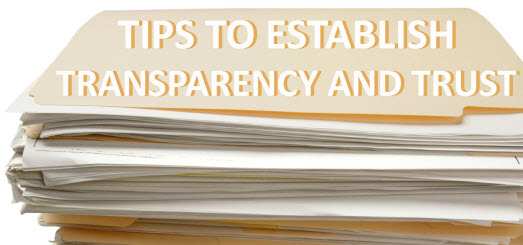Tips for Establishing Transparency and Trust Among Stakeholders

Ethical leaders value transparency. No, I am not talking about the plastic, see-through sheets your math teachers placed on overhead projectors to demonstrate algebra problems. Transparency, in this sense, refers to an organization’s accountability and authenticity of business operations.
Recently, nearly 11.5 million documents were leaked from the fourth largest offshore, secretive law firm in the world, Mossack Fonseca. These documents, dubbed the Panama Papers, were obtained from an anonymous source by the German newspaper Süddeutsche Zeitung and shared by the International Consortium of Investigative Journalists with the Guardian and the BBC. These files revealed how this firm helped influential clients launder money, skirt around sanctions and avoid paying taxes.
The leak caused an international uproar and countries, such as Iceland, have demanded that authoritative heads resign. France, Australia, Mexico and the United Kingdom announced they will launch separate investigations. World known leaders associated with the documents include: Russian President Vladimir Putin, Iceland Prime Minister Sigmundur David Gunnlaugsson and members from FIFA’s ethics committee.
Whether Mossack Fonseca conducted legal or illegal business practices, the general public’s perception of the recent developments can be depicted as deceitful, cloudy and perhaps even unethical. This situation will certainly have implications for not only the law firm, but all of the clients involved.
Being transparent with your stakeholders is vital in establishing trust within your organization. Here are tips that will help ensure trust and transparency remains top-of-mind among all parties involved:
1. Do what you say and say what you do
Make sure you are deliberate in practicing what you preach. It’s important to remember you should always represent your organization’s mission and values.
2. There is no "I" in team
You may think you’ve just come up with your company’s next big idea, however; someone else’s ethical compass may be facing another way. In business ethics, the answer isn’t always clear. Embrace differing opinions and collaborate!
3. Stay timely
Always "being the last to know" can create an environment where people feel uneasy and confused. Communicate with your stakeholders regularly and keep them in the loop if sudden changes arise.
4. Be specific
The devil is in the details! Provide insight for your stakeholders, and show your stakeholders you know what you are talking about by providing specific and thoughtful information.
5. Say thank you
Were you actually the one who came up with that next big idea? Or… did Jennifer from the marketing department? Give acknowledgment and show genuine appreciation for those who helped strategize on the latest business developments.
— Ashley Metivier
Activities Coordinator, NASBA Center for the Public Trust (CPT)
